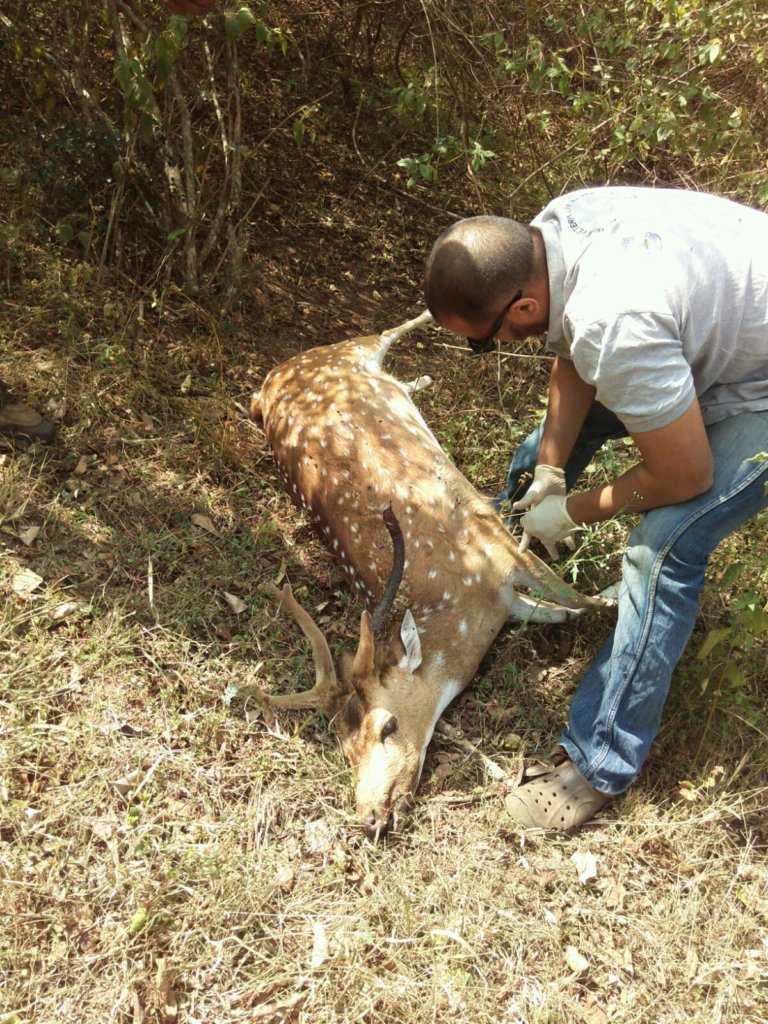By Abhishek Narayanan | Officer in charge
Since inception on 9th June'15 till December 2015, the MVS-Bandipur unit has attended to 35 cases of wildlife displacements (including tigers, leopards, elephants), 34 indirect and 10 direct interventions during human-large carnivore conflict, 8 cases of captive elephants (including the admitted orphaned calf), 68 cases of domestic animals (cattle, sheep and dogs) and conducted 22 necropsies of wildlife that died (in situ and ex situ). In addition to this, the team also visited several villages and interacted with locals while sensitizing them towards conservation of all species (with emphasis on mitigating human-large carnivore conflict).
Following are the activities done by the MVS unit in the month of February 2016:
A.Wildlife rescue, rehabilitation and conflict mitigation
The MVS Unit was called out to the Mettikuppe Range of Nagarhole, to an area bordering the Bandipur Tiger Reserve to rescue and rehabilitate a very large Short Toed Snake Eagle. The eagle had been found wandering in a village and had been brought back and dumped at the Department office. The eagle was severely dehydrated and had a fractured left wing. The wing was splinted and the bird treated. After a few days of care, the bird was released back into the Mettikuppe Range where he flew for several hundred meters unassisted. He was sighted several times over the next week by Forest Department Watchers who informed the team that he had successfully managed to kill several lizards and a rodent.
The MVS Veterinarian was handed an orphaned mottled wood owl, whose mother had reportedly been killed by a snake. The baby owl was hand reared by the MVS Veterinarian and is due for release in March.
The Rusty Spotted Cat is due for release in March.
One crow was found by a farmer on a plot adjacent to the MVS Field Station. It had been electrocuted on a solar fence. After a month of treatment, the crow escaped and now lives near the Field Station Premises.
On the 20th of February, the MVS Unit attended to a case in which a large Chital Doe was found impaled on fence spikes outside a popular resort on the perimeter of the park. The deer was lifted off the spikes and brought to the RFO Office in G.S. Betta by the resort staff. The deer was sedated and treated. After it stabilized, the deer was taken to the Mysore Zoo for intensive care. However due to the massive amounts of stress in went through and an associated spinal injury due to its movement while impaled, the deer passed away a week later.
B.Disease investigation
Several more cases of suspected Foot and mouth disease were observed around Bandipur. In one case, an entire drove of wild boars with around 40 individuals was reported showing signs of the disease. The incident was reported to the Forest Department and Animal Husbandry Department. In the future, both Departments will work closely together alongside the MVS team to ensure strict vaccination protocols and a comprehensive vaccination programme.
C.Captive animal care
1)Domestic animals: Cattle continued to be lifted in the Kundkere Range, with 6 cows and 1 bullock being killed and eaten by a tiger. The MVS Veterinarian treated several cattle and sheep for foot and mouth disease around the Kundkere Range and Hediyala Ranges. A dog was dumped at the Bandipur Police Check post by a private car with 2 occupants on its way to Kerala. The dog had several maggot wounds and was very thin. He also showed signs of severe prior abuse. We caught him, sedated him, and then treated his wounds. The dog was adopted on 3/3/15. The MVS Veterinarian treated a severe ear infection in a dog in Mangala Village; another dog with a chronic case of blindness due to a persistent infection was treated. The blind dog has since regained its sight in one eye. Treated a chronic case of hypopyon and eye infection in a dog. Dog has since regained its sight.
2) Captive elephants: Continued the treatment of the injured elephant calves who have now completely recovered from their wounds. The MVS Veterinarian was called to BRT by the CF in charge to treat Gajendra, a large captive tusker in BRT who had a large abscess on his right flank. The abscess has since healed after multiple applications of a topical cream compounded specifically for his wound.
D.Awareness and training programs
Assisted in conducting a workshop on DTR software for the forest officials in Nagarhole and in the preparation of slogans and signboards that are to be placed around Nagarhole Tourist areas.
E. Plan for next month
The MVS Team will continue to attend to wild animal and livestock cases in and around the Bandipur Tiger Reserve and carry out awareness campaigns in areas of high human-animal conflict.
By Abhishek Narayanan | Officer in Charge
By Abhishek Narayanan | Officer in Charge
Project reports on GlobalGiving are posted directly to globalgiving.org by Project Leaders as they are completed, generally every 3-4 months. To protect the integrity of these documents, GlobalGiving does not alter them; therefore you may find some language or formatting issues.
If you donate to this project or have donated to this project, you can receive an email when this project posts a report. You can also subscribe for reports without donating.
Support this important cause by creating a personalized fundraising page.
Start a Fundraiser